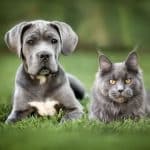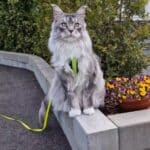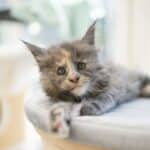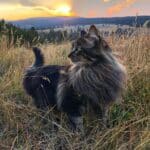There could be a couple of reasons why your Maine Coon cat seems to be small. Due to the fact that it is a Maine Coon, we just naturally expect the gentle giant of the feline family. All cats do differ in size, in general, the Maine Coon could be anywhere from 8 pounds or higher. This is at full maturity. Fun fact, a Maine Coon cat can take up to four or five years to fully mature.
The average female Maine Coons are generally between 10 and 15 pounds, while the male is larger, coming in at up to 25 pounds in some cases.
Possible Reasons
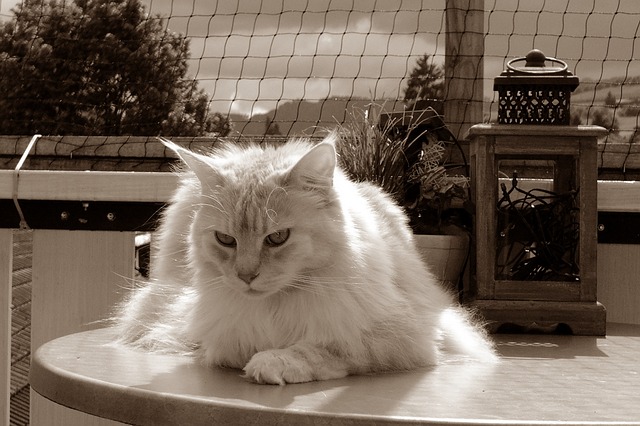
Still Maturing
One of the first reasons that your Maine Coon is still small, could very likely be that he or she is not done maturing yet. This means we need to sit back and enjoy the time while he or she is still relatively small. Maine Coons are known to be the largest breed of cat there are, that are registered. The breed has a life expectancy of up to 12 to 15 years.
Since it can take up to 4 or 5 years for a Maine Coon to mature fully, it is likely that your baby does not seem to be one of the gentle giants. One good sign to watch for is the growth after age two to three. A Maine Coon will continue to grow, while a half breed will likely stop growing between two and three years.
Hybrid
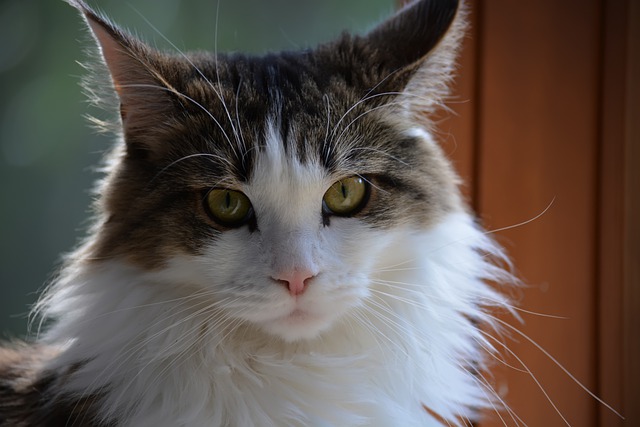
It is possible that your Maine Coon is a descendant of the domesticated breeds and the long-haired Norwegian breed brought over by the Seafarer’s. This is a possibility because there is no definitive proof of how the Maine Coon came to be. Genetics are a strange science. It may be possible that all generations prior to your furball were likely larger.
However, even at the smallest of sizes, the Maine Coon is larger than the domesticated house cat. That may not ease your mind at all, however, to know for sure, the only thing to do is to have a complete genetics test run.
What may help to make you feel as though you do have a gentle giant Maine Coon, is to keep routine documentation as to weight, and length. This is the true way to tell if the Maine Coon is growing at all. Of course, on the other end of the guide is the possibility that the breeder you bought your Maine Coon from has deceived you. There are different reasons for this.
Maybe he is not a registered breeder of Maine Coons. When a breeder is registered, they have guidelines, laws and other standards that they must comply with. This is the main reason that buying a Maine Coon can be so expensive.
A non-registered breeder may claim he is registered, or that he just fell behind in getting the registration. They will still try to charge the same high costs, without providing papers to prove registration and purity. Initial exams and vet care, The costs could also include a portion of building costs and maintenance costs.
Before you make the purchase, before you even agree to a purchase, check for the full registration. Ask multiple questions, take a tour, speak to the vet. Do Not make a purchase or an agreement until you are confident that the breeder is legitimate. If you do come across one that cannot provide papers, proof or properly answer questions. These types should be reported to the Animal Associations.
Other Possibilities
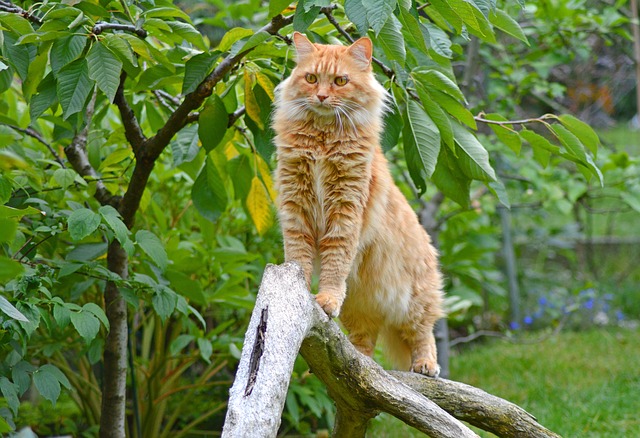
There could be any number of reasons why your Maine Coon is small. The following is a list of possibilities.
- Dwarfism is a genetic abnormality that can happen in cats also.
- Slow Growth rate, it may seem that your cat should be done, but a Maine Coon can take up to five years to fully develop.
- Poor nutrition will hinder a cat’s growth. Be sure you are following the Vet’s advice and feeding your Maine Coon a nutritious diet.
- Small parents could be the reason your cat is small.
- Your cat may be a hybrid, or mixed breed.
- Hyperthyroidism is when the thyroid produces too much thyroxine, inhibiting growth.
- Runt of the litter. This means that the mother may have a Y-shaped uterus and the fetus is the smallest of the litter.
- Premature Weaning is when a kitten is taken away from the mother cat too soon. The kitten did not receive the nutrition it needed.
- Enzyme deficiency in the cat would cause the Maine Coon to be abnormally small.
- Parasites or Infections could cause a stunted growth in the Maine Coon.
- Portosystemic Shunt is a rare condition in Maine Coons and other felines that causes a circulatory issues
- Cancer or other underlying health issues.
Average Numbers
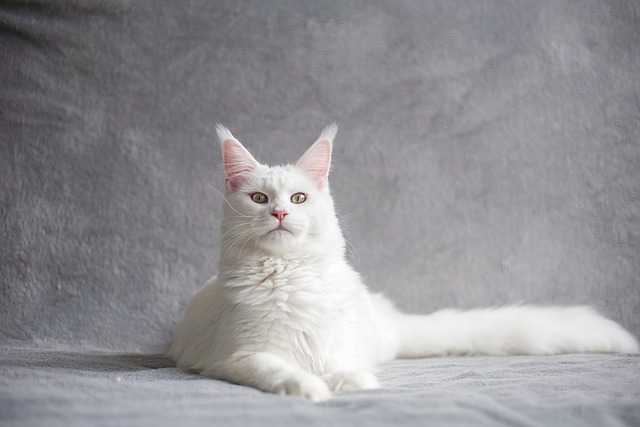
While it is common knowledge that the Maine Coon is the Gentle Giant of the felines, the information that is provided should only be taken roughly. An average male Maine Coon can grow to 10 to 16 inches in height and up to 40 inches in length, and they could weigh from 15 to 25 pounds.
The female Maine Coon on average will be 8 to 14 inches in height, and her length could be as much as 40 inches, just like the Male Maine Coon. The average weight for a female Maine Coon is between 10 to 15 pounds.
It is highly important to remember two important statements,
1.) The given information is the average height, length and weight; in both males and females. What this translates to is that it depends on how many Maine Coons were weighed and measured to get this average. You would take the number of Maine Coons and divide the total of all their weights to get the average. There will be some smaller than average just as there will be some larger than average.
2.) No matter how you look at it, a Maine Coon cat will be on the average, larger than any other cat breed there is. Even a small Maine Coon will be larger than most domesticated feline breeds.
Now, in all reality, there is no way we can increase the height or length of your Maine Coon. What we can do is emphasize the importance of a nutritious diet. For a Maine Coon, that diet should be low in carbohydrates, have a mid range of fats and be in the higher range of proteins. You should never force a cat to be fed a vegetarian diet.
The food that you buy your Maine Coon to eat should include a host of nutrients.
- Vitamin A and D
- Taurine
- Arginine
- Arachidonic Acid
These are nutrients that your cat needs, if necessary you will need supplements. And, remember, cats may like nibbling on your food, but that cannot be their diet. Not all human food should be given to animals. Some can be highly toxic.
Medical Needs
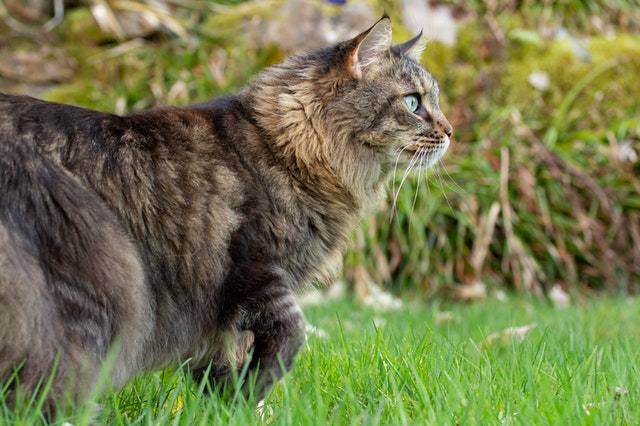
If you have come this far in the list and it does not sound like anything that your Maine Coon is going through, then it could be weight loss that is concerning you. If your Maine Coon is eating and drinking normally, yet still seems to be losing weight, it is time for a visit with your veterinarian. The vet will check weight, height and length, this will determine if there has been any growth.
Just like with human kids, growth spurts may happen. Sometimes the cat will look thin when they shouldn’t, only to find out that they have changed in height or length. Think about how many times you have noticed that your son's pants seem shorter than they did last week when they were new. It is possible that the Maine Coon has thinned out while getting longer, but the weight has not changed.
The other possibility is that there is some serious medical condition happening to your Maine Coon. There should be no amount of weight loss, especially a drastic change, if there has been no change in diet or activity level. There have been some cases in canines, where the dog lost a drastic amount of weight for no obvious reason, however, a week later they crossed the rainbow bridge.
Speak with your veterinarian if weight and size has become a concern to you. Again, please remember, the weights and measurements that you read are based on the average of many Maine Coons. Not all Maine Coons will be on the large size, some will just naturally be smaller. Your veterinarian will be able to do an examination to determine if there is a medical reason for the small stature.
A genetic test can determine if there are mixed breeds in the lineage. Allow the vet to do his job and determine what the issue is. Plans, if needed, can then move forward to help the Maine Coon if there is a medical concern.
In summary, not all cats are average. You would not want your fur baby to be just an average feline. Some will be bigger, some will be more cuddly, some may be more playful and some lazier. None of that matters, what does matter is that your Maine Coon is happy and healthy!

